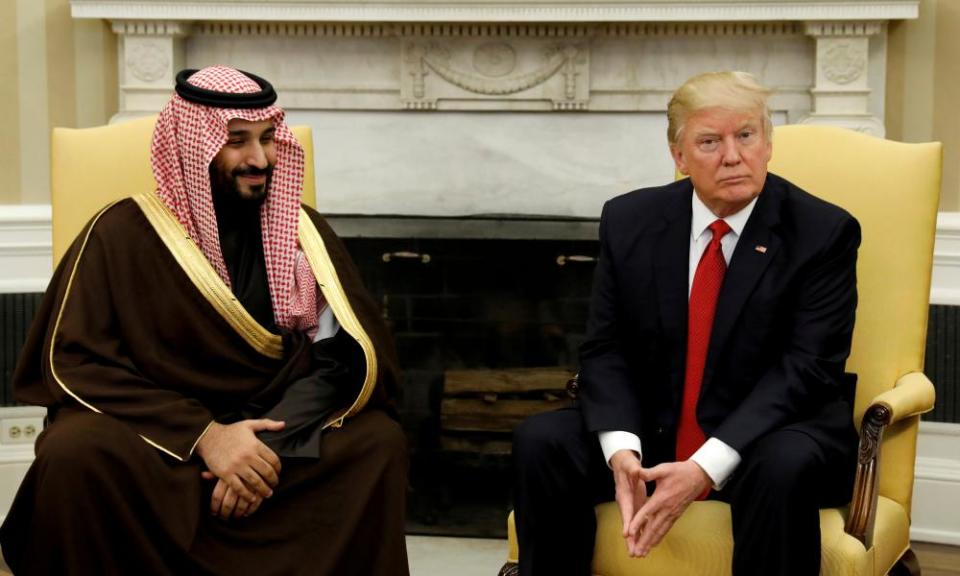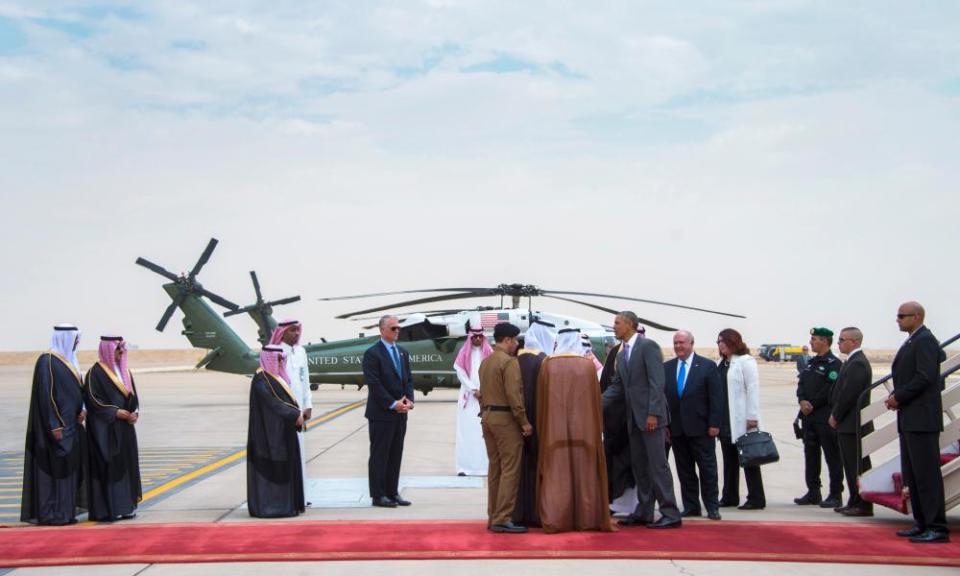Saudis eye Iran and ignore Trump's temperament as red carpet rolled out
Riyadh believes Trump will prove a more natural ally after eight years of strained ties with Obama – and is hopeful of signing massive weapons deal

Saudi Arabia has prepared a spectacular – if wary – welcome for Donald Trump, ignoring mounting concerns about his temperament and insisting that his visit on Saturday will reconfirm the Kingdom’s status as a regional force.
Gleeful officials say the US president’s decision to make Riyadh the first stop in his first foreign trip in office sends a powerful message underlining Saudi Arabia’s clout after eight years of strained bilateral ties under Barack Obama.
Besieged by scandal at home, Trump heads abroad with an ambitious agenda that aims to stake his claim as a global leader, first by delivering a speech on Islam in the religion’s birthplace, and then moving on to Jerusalem and Rome – epicentres of the world’s two other main monotheistic religions – before concluding his trip at Nato and G7 summits.
Leaders in Riyadh also believe that Trump will sign on to one of the biggest weapons deals in history and unveil plans to form and back an ‘Arab Nato’ – drastically emboldening a US-led pact that had underwritten the regional security order until early in the Obama administration.
The Saudi leadership has bought into a central theme of Trump’s planned speech – confronting extremist ideology – claiming that emboldened bilateral ties will help it rein in ultra-conservative wahhabi thought that governs life in the Kingdom – and which clerics have been widely accused of exporting elsewhere in the Islamic world.
The most anticipated address of Trump’s chaotic six months in office is aimed at marking a reset with Muslim states, which were unsettled by his public statements on Islam throughout the presidential campaign but have been since the inauguration found some reassurance in his administration’s combative stance towards Iran.
“Iran is the grand prize here,” said one member of the Saudi royal family, who declined to be named. “Everything else is bells and whistles.”
The Kingdom’s deputy crown prince and defence minister, Mohammad bin Salman has used the Trump visit to amplify his wide-reaching reform program, which includes an overhaul of a bloated public sector, and hopes to encourage more openness through entertainment and cultural exchanges. Such concerns may not be completely laid to rest by a men-only concert after Trump’s speech by the country star Toby Keith – known for such hits as I Like Girls that Drink Beer and The Angry American.
Saudi officials also appear to have conditioned their moves against extremist wahhabism on US support for their agenda on reforms and Iran.
“The war against extremism is a centrepiece of that,” said the royal family member. They’re in part saying to Trump: ‘We’ll do you a deal.’”
Saudi and US flags are already fluttering along streets in Riyadh’s central business district. Trump’s domestic travails, and his colourful past as a businessman and television personality, are well known across the capital. There remains deep scepticism about his reasons for visiting, but also a recognition that his past as a dealmaker may prove useful.
“Does he get Iran? No, but his advisers do,” said Khaled Salman, a finance broker. “And so do the hosts on his next stop.” Before Trump travels to Jerusalem on Monday, he will be a guest alongside 50 Arab and Muslim leaders at a banquet that Saudi leader King Salman says will “forge a new partnership”.
The central plank of those closer relations is opposition to Iran, whose leaders Mohammad bin Salman recently accused of trying to “control the Islamic world”.

Trump has attempted to dismantle Obama’s agenda at home and abroad, whittling away at healthcare reforms, climate change and long established trade arrangements. But he appears especially enthusiastic to overturn the Obama-led rapprochement with Iran, which culminated in a historic nuclear deal aimed at enticing the country to stop its nuclear program in return for a gradual lifting of crippling sanctions.
Moving away from detente with Iran and making a high-profile visit to Saudi Arabia restores a default position that for most of the past four decades had seen the US ally with Saudi Arabia and the Gulf countries as a bulwark against Tehran.
Trump is also likely to lobby Saudi leaders to form closer ties with Israel, arguing that all three states share a common foe. Sporadic ties between Riyadh and Tel Aviv have existed since the mid-70s, but have become more frequent over the past 15 years, during which both countries became convinced that Iran was building a secret nuclear weapons program.
Saudi Arabia, too, is determined to mark a reset after years of increasing bitterness towards Obama. When Trump’s predecessor visited Riyadh last year, he was snubbed by the King and greeted at the airport by the governor of Riyadh. Trump’s planned welcome could not be more contrasting.
“It’s a little bit personal for King Salman,” said one Saudi newspaper columnist who said he had been forbidden from giving interviews. “He doesn’t care if Obama wriggles as he writes his memoirs, but doesn’t expect him to either. He made it very clear that he thought Iran were the good guys and we were the villains.”
The perception that Saudi Arabia had facilitated the rise of extremist groups was widespread among senior Obama officials, who viewed some Saudi leaders suspiciously and claimed that proselytising by senior clerics and some officials had had spread rigid wahhabi thought into Islamic countries it had regarded as “moderate”.
The new administration has eschewed such comments, but Trump himself has claimed that “Islam hates us”, attempted to bring in a travel ban targeting six Muslim-majority countries and has hinted at immigration policies that make it more difficult for muslims to live and work in the US.
His stance towards an Arab Nato will be closely studied by Riyadh, which has suggested the idea for many years within the framework of standing arrangements – that the US offer leadership and financial support.
Trump has so far favoured bilateral models that shift the burden of payment to allies. But his reluctance to write cheques may be tempered by the suggested size of the arms deal: up to $100bn in new weapons to the Saudi military, much of which will be diverted to the ongoing, contentious, war in Yemen that has pitched Saudi forces against Houthi rebels, which Riyadh claims are directed by Iran.

